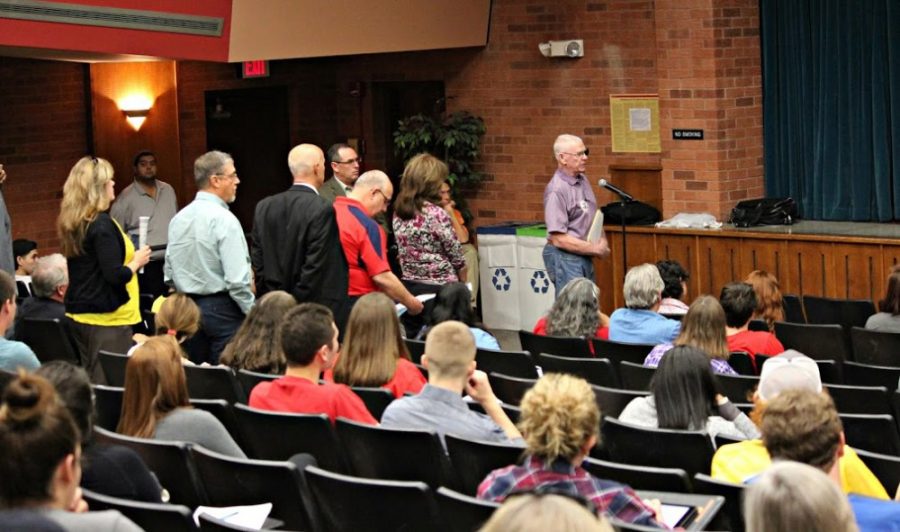On Saturday, Arizona Rep. and Vice-Chairman of the House Appropriations Committee of the State Justin Olson along with state Reps. Randall Friese, Stefanie Mach, Vince Leach and Sen. Steve Farleymet with Tucsonans and UA students at a town hall meeting geared toward the state budget.
The UA was the fourth stop in a state tour Olson is taking to gather opinions for the upcoming annual state budget. In the past two weeks he has visited Flagstaff, Gilbert and Glendale, Arizona.
Before opening up the floor to public comment, Olson gave a run-down of the state budget, showing the Joint Legislative Budget Committee’s baseline predictions for the fiscal year 2017 and Gov. Doug Ducey’s proposed executive budget.
The JLBC predicts Arizona is on track to be structurally balanced for the first time since the Great Recession in 2007. Not including new budget proposals or tax packages, the state is projected to finish FY2017 with a surplus of $26 million, a surplus that in optimal conditions, would continue to increase in FY2018 and FY2019.
However, Olson explained that the governor’s proposed budget is based on different assumptions of total income. If the governor’s proposals were to be put in place, given the JLBC’s expectation of income, the state would be running a $79 million deficit after FY2017.
This is not including the package of tax cuts that Olson believes is forthcoming from Ducey’s office.
After Olson’s presentation, Friese and Mach, both Democratic representatives, shared their opinions on the budget with attendees.
Mach said that the legislature had rushed to approve the budget for FY2016 last March, taking 81 days rather than the constitutionally allowed 100.
“The reason why we did it is because, in my opinion, that we wanted to rush it through before we realized what we were going to have as state revenues, so that we could continue to cut the budget as is the majority’s perspective,” Mach said.
This was the year funding was cut from Pima Community College and other community colleges, as well as an additional $99 million from state universities. They are now planning to give only $8 million back to the universities, Mach said.
Friese and Mach said there is $600 million of one-time monies available in FY2016.
“Let’s think about the resources and the services that we can reinstitute, that we can reinvest for you to benefit,” Friese said.
In the public comments that followed, incarceration rates and funding for the elderly and disabled were discussed frequently .
Sarah Burkey, a UA senior studying political science and philosophy, politics, economics and law, was one of the people who told representatives she was disappointed in the amount of money spent on prisons relative to education in Arizona.
Burkey applied to a few law schools around the nation and found that is was cheaper to go to school in Virginia rather than continue her education in Arizona, even though she is an Arizona resident.
“I wanted to stay in this state; I love this state, and I wasn’t able to do so,” she said
In FY2016, $1 billion was allocated to the Arizona Department of Corrections — roughly 11 percent of the state’s $9.2 billion annual budget.
Burkey suggested that to save money, the state start investing in the health of its criminals and prisoners, as Texas did in its 2007 Justice Reinvestment Initiative, citing Patty Machelor’s article which ran in the Arizona Daily Star in June 2015.
Many who spoke up at the town hall event also spoke about increasing funding to organizations that care for the elderly and those with intellectual disabilities. Various representatives of these organizations mentioned that they did not have enough funds to pay employees at the rate necessary to keep a full staff.
Gina Judy, the chief administrative officer for Portable Practical Education Preparation, Inc. ENCOMPASS and PPEP Behavioral Health, works with individuals with intellectual and developmental disabilities.
“Back in 2009, services were cut by 15 percent and while I really appreciate the fact that some of those dollars have been restored, I presently only am able to receive in the rates $4 a day to provide meals for individuals,” Judy said. “I don’t have enough employees willing to work for $8.50 an hour to even be able to continue to provide these services.”
After public comments were finished, the state representatives and Farley gave closing statements thanking the public for having the courage to express their views. Olson planned to travel to hold a town hall event in Saddlebrook, Arizona, that afternoon.
Overall, Zachary Berenson, Associated Students of the University of Arizona director of Local Affairs, felt the town hall event was a success.
“One the representatives who has been going around with Justin Olson in the state doing these kind of town hall events came up to me — and I was very honored — to tell me that this was the most successful and the most people that they’d seen,” Berenson said.
It is left to see what changes the representatives will work to implement in the state budget for FY2017.
Follow Michelle Jaquette on Twitter.









